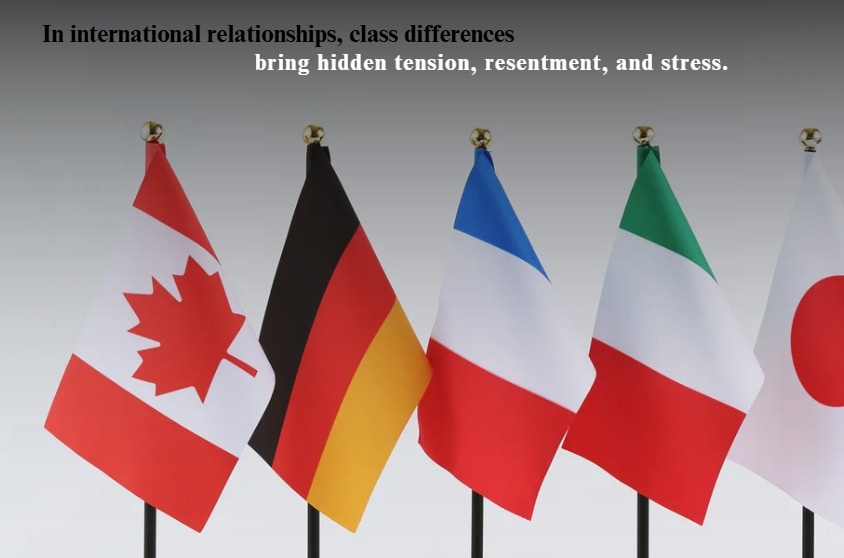October 20, 2025
International LoveWhen Love Meets Money: Protecting Your Family, Assets, and Freedom Across Borders

Key Highlights
- International love requires a structural plan. Cross-border marriages introduce complex legal and financial realities involving immigration law and estate tax planning.
- Your residency can be tied to your relationship. Obtaining a green card through a foreign spouse often leads to conditional permanent resident status, which can be at risk during a divorce.
- Global assets require global protection. Without proper international estate planning, your worldwide assets can be subject to double taxation or unintended inheritance laws in a foreign country.
- Citizenship is not the only factor in taxation. The United States taxes based on citizenship, while many other nations tax based on domicile, creating complex scenarios for cross-border couples.
- Inheritance trusts and foundations are crucial tools. These structures can secure wealth, protect family members, and ensure your assets are distributed according to your wishes, regardless of jurisdiction.
Introduction

Love doesn’t ruin families. Money does. This isn’t a cynical view; it’s a structural reality. When you fall in love across borders, you’re not just merging two hearts—you’re colliding two legal systems, two tax codes, and two sets of cultural expectations about wealth. This guide is built on hard truths and real stories. We will uncover the hidden risks of international relationships and give you the structural solutions to protect your assets, your family, and your freedom. You will learn how to navigate the intersection of love and law in the United States and abroad, securing your future before a crisis forces your hand.
Love and Money Abroad: The Emotional Stakes of Crossing Border
The beauty of a global romance is undeniable a life built between cultures, languages, and experiences. But that beauty becomes chaotic when bureaucracy enters the picture. Suddenly, your connection is defined not just by emotion, but by petitions, eligibility requirements, and the cold logic of immigration law. Your love story is now a case file, and the stakes are no longer just your heart, but your ability to live in a new country with the person you love.
This is the moment your relationship transforms. It’s no longer just about two people; it’s about navigatingshe complex path to securing a foreign spouse’s permanent resident status, a journey filled with both powerful opportunities for a shared future and unique risks that can tear it all apart. Love might be global, but laws are not. Understanding the difference is the first step toward true freedom.
How International Marriage Creates Powerful Opportunities and Unique Risks

For a married couple, an international marriage to a U.S. citizen opens the door to incredible opportunities, starting with the path to a green card. This isn't just a document; it's the key to building a life together in the United States. But this opportunity comes with a rigid, unforgiving process. The U.S. government legally defines a spouse as a legally wedded husband or wife, a distinction that can disqualify common-law arrangements depending on where the marriage occurred.
The risks are woven into the very fabric of this process. The location of the property you own, the citizenship of your family members, and your financial standing are all scrutinized. For a green card holder petitioning for a spouse, the rules and timelines are different than for a citizen, adding another layer of complexity.
Are there special considerations for cross-cultural marriages in terms of residency? Absolutely. The entire system is a special consideration. You are not just proving your love; you are proving its legal validity to a government that holds the power to unite or separate you.
Real-Life Stories: When Passion Meets Global Complexity

Think of the American expat who falls in love in a country with different succession laws, only to find their U.S.-based will is meaningless there. Or the foreign spouse who arrives in the U.S. on a conditional permanent resident card, believing their future is secure, only to discover their residency is tied directly to the marriage’s two-year anniversary. These aren't hypotheticals; they are the lived realities of global couples.
The journey from your home country to a new life requires more than passion; it demands proof. You must demonstrate good moral character, pass medical exams, and navigate a mountain of paperwork. What is the process for obtaining an immigrant visa as a spouse of a U.S. citizen? It begins with a petition, moves to the National Visa Center, and culminates in a high-stakes interview where your life is laid bare.
Each step is a test. Every document is a potential pitfall. When passion meets this level of global complexity, the unprepared often find their dreams tangled in red tape, their love story held hostage by a missing form or a misunderstood rule.
Cultural Collisions in Relationships: Navigating Expectations and Traditions

When you build a life with someone from another culture, you’re navigating more than just language barriers. You are merging different expectations about family, money, and duty. In many parts of the world, family wealth is communal, while in others, it’s fiercely individual. These unspoken rules can create deep fractures in a relationship, especially when one partner comes from a new country with vastly different traditions.
As a green card holder or citizen, your financial world is governed by U.S. law, but your partner’s might be shaped by civil law countries where "forced heirship" dictates who inherits assets, regardless of your wishes. These are not minor differences; they are fundamental collisions of legal and cultural DNA that can put your entire financial future at risk.
From Wedding Vows to Wealth Transfers: Unpacking International Marriage Dynamics
Your marriage certificate is a legal document, but its power changes at every border. In the U.S., it allows you to begin the immigration process for your spouse. But what about your assets? Wealth transfers between spouses are often complex, especially when one partner is not a U.S. citizen. The U.S. offers an unlimited marital deduction for transfers to a citizen spouse, but for a non-citizen spouse, the rules are drastically different and far more restrictive.
How does marrying a U.S. citizen affect your eligibility for a green card? It makes you an "immediate relative," which is the fastest track, but it also subjects your entire financial and personal history to intense scrutiny. Your estate plan must also be re-evaluated.
Many countries have gift tax treaties with the U.S. to prevent double taxation, but many do not. If your partner is from a country without such a treaty, a simple gift could trigger a massive and unexpected tax bill. Your wedding vows promised a shared life, but they didn’t account for colliding tax regimes.
Familial Pressure, Financial Imbalance, and the Lure of Global Living
Financial imbalance is a silent stressor in any relationship, but in a cross-border marriage, it’s magnified. One partner may come from a culture where they are expected to support not just their spouse but also their extended family members back home. This can create immense pressure, especially if the U.S.-based partner is unaware of these deep-seated cultural obligations.
The move to a new country can amplify this imbalance. The immigrating spouse may be unable to work initially, creating total financial dependency. This dependency can be a source of tension and, in the worst cases, control. Furthermore, without careful planning, generosity can be penalized.
The U.S. imposes a gift tax on significant transfers of wealth. While there is a lifetime exemption amount, gifts to non-citizen spouses have a much lower annual limit. What you see as sharing your life, the government may see as a taxable event. The lure of global living is powerful, but it demands that you see your money through the eyes of the law.
Building Structure: International Prenups and Cross-Border Protection

Emotion drives you into a relationship; structure is what allows it to survive reality. For couples in cross-border marriages, that structure is non-negotiable. An international prenup isn’t a sign of mistrust—it’s a declaration of clarity and respect. It is an essential tool for asset protection when two different legal and financial worlds collide.
Seeking legal advice to create this framework is the most loving thing you can do for your relationship. It replaces assumptions with agreements, protecting both the wealthier and the less wealthy partner. It ensures that if the worst happens, the fallout is contained, allowing both individuals to move forward without losing everything.
Why Every Couple Needs an International Prenup (Even If You Trust Each Other)
Trust is emotional. A contract is structural. An international prenup is a strategic tool for every married couple navigating global life, especially when one is a foreign spouse. It's not about planning for failure; it's about building a foundation strong enough to withstand any storm. Why is it so crucial?
- Jurisdictional Clarity: It defines which country's laws will apply in the event of a divorce, preventing a costly and confusing legal battle across multiple jurisdictions.
- Asset Definition: It clearly separates pre-marital and inherited assets from marital property, protecting family wealth and personal inheritances from being divided.
- Spousal Support: It sets clear expectations for alimony or spousal support, respecting both partners' contributions and financial situations without leaving it to a foreign court's discretion.
Relying on trust alone is a gamble. Seeking legal advice to draft a prenup is an act of profound responsibility. It’s acknowledging that your love story exists within a world of complex laws and that you are smart enough to plan for them.
Offshore Asset Protection and Holding Structures Explained
For international couples, your assets are not as safe as you think. Offshore asset protection is not about hiding money; it's about legally insulating your wealth from threats you may not even see coming—a lawsuit in a foreign country, a divorce under an unfavorable legal system, or unexpected estate taxes. Holding structures are the vehicles that provide this insulation.
These structures place your worldwide assets into legal entities like trusts or foundations, separating your personal ownership from the assets themselves. This means that if you are personally sued or divorced, the trust assets may be protected from seizure. It’s about building a firewall between your life and your legacy.
Here is a simple breakdown of common structures:

Expat Divorce: Threats to Residency, Citizenship, and Financial Freedom
Divorce doesn’t just take your heart. It can take your home, your passport, and your freedom. For an expatriate spouse, a divorce can trigger a cascade of legal crises that threaten their very right to remain in the country. If your permanent resident status was granted based on marriage, a divorce can put your future in jeopardy, especially if it happens within the first two years.
This is not just an emotional crisis; it’s an immigration crisis. The end of a marriage can invalidate the very foundation of your legal status, rolling back all the progress you made. Your immigration benefits are tied to the viability of the relationship, and when it ends, so can your right to the life you’ve built.
Protecting Your Family During an Expat Divorce

When an expat marriage dissolves, the first priority is stability, especially for your family members. If you have minor children, their welfare and residency are paramount. However, the legal ground beneath you can feel like it's shaking. If your spouse received a conditional permanent resident card (CR visa), a divorce before the two-year mark complicates the process of removing those conditions.
You must prove the marriage was entered into in good faith, not just for an immigration benefit. Divorce decrees are critical documents, but they don't automatically solve the immigration problem. What happens to your residency status if you get divorced after a marriage-based green card? If it’s a conditional green card, you must file a waiver to remove the conditions on your own, a process that requires substantial evidence of your bona fide marriage.
Protecting your family means understanding these rules before a crisis hits. It means keeping meticulous records of your shared life—joint bank accounts, photos, affidavits from friends—to prove your marriage was real, even if it didn't last.
What Happens to Your Visa, Assets, and Access After Divorce
A divorce can slam the door on your future. Your access to the country, your assets, and even your children can be thrown into question. For the immigrating spouse, the immediate fear is the loss of permanent residence. Without proactive legal steps, a divorce can lead to the termination of your status and potential removal from the country. This is where having expert visa services on your side is critical.
Beyond the immigrant visa itself, your financial life can be frozen. Joint bank accounts can be emptied, and access to offshore entities can be blocked if not structured correctly from the start. This is why asset protection isn't a luxury; it's a necessity.
What happens to your residency status if you get divorced after a marriage-based green card? If you’ve already removed the conditions and have a 10-year green card, your residency is generally secure. But if you are still in the conditional period, the fight to stay has just begun. You are no longer a spouse; you are an applicant who must prove your case alone.
Inheritance Protection: Keeping Legacy Safe Across Jurisdictions
You’ve spent a lifetime building your wealth. But if your family is spread across the globe, that legacy is at risk. Different inheritance tax laws and a lack of estate tax treaties between countries can mean that your heirs receive only a fraction of what you intended. Your U.S.-based estate plan may be completely ignored in a civil law country, where forced heirship rules dictate who gets your assets.
Protecting your legacy requires a global strategy. Using tools like offshore trusts is not about avoiding taxes but about ensuring certainty. It’s about making sure your worldwide assets are passed down according to your wishes, not the conflicting laws of multiple nations.
International Estate Planning for Families with Multinational Ties

For families with multinational ties, a simple will is not enough. International estate planning is the art of creating a resilient structure that can withstand the pressures of different legal systems and tax regimes. The U.S. imposes a federal estate tax on the worldwide assets of its citizens, regardless of where they live. Meanwhile, the country where you reside may impose its own inheritance tax on your heirs.
This creates a serious risk of double taxation. While the U.S. has tax treaties with some countries to mitigate this, many nations have no such agreement. How do international estate planning issues impact couples with different residencies? They create a minefield of conflicting rules. For example, a U.S. citizen living in Italy with a vacation home there will find that Italian law governs the house's transfer, potentially overriding their U.S. will and imposing Italian inheritance taxes.
You must plan for the laws of every country where you and your beneficiaries reside and where your assets are located. Your plan must be as global as your family.
How Offshore Trusts and Foundations Secure Wealth for Future Generations
Offshore trusts and foundations are the most powerful tools for securing multigenerational wealth. They work by transferring legal ownership of your assets to a trustee or foundation council in a jurisdiction with strong asset protection laws. You no longer personally own the assets; the trust does. This simple legal step creates a powerful shield.
Can inheritance trusts help protect assets in cross-border marriages? Yes, unequivocally. By placing assets into an irrevocable trust, they are generally protected from being classified as marital property in a divorce. The trust assets belong to the trust, not to you or your spouse, ensuring they are preserved for your intended beneficiaries, such as your children. Foundations, common in civil law countries, offer similar protections.
These structures also solve inheritance problems. A trust’s instructions for distribution override local forced heirship rules, ensuring your wealth is passed down according to your wishes. With a high federal exemption amount in the U.S., the focus is often on control and protection, not just tax avoidance. A trust ensures your legacy endures.
Conclusion
In conclusion, navigating the intricate dance between love and money across borders requires a blend of emotional insight and strategic planning. As we've explored, the unique challenges of international relationships can lead to profound opportunities, but they also come with risks that could threaten not just your finances, but your very freedom. By prioritizing structure through international prenups, estate planning, and asset protection, you ensure that your love story is safeguarded against unforeseen complications. Remember, it’s about creating a solid foundation that allows your relationship to flourish without the burden of financial uncertainty. If you're ready to take proactive steps in protecting your family and wealth, consider booking a brief consultation today. Love deeply. Structure wisely. Because the only thing more expensive than divorce is being unprepared.
Frequently Asked Questions

How Does Marrying a U.S. Citizen Affect Your Residency and Green Card Eligibility?
Marrying a U.S. citizen makes you an "immediate relative," placing you in the highest priority category for a green card. You can become a permanent resident faster than in other family-based categories. However, you must still meet all eligibility requirements, provide a marriage certificate, and prove the marriage is bona fide through the immigration services process.
Can Inheritance Trusts Help Protect Assets in Cross-Border Marriages?
Yes. Inheritance trusts, particularly irrevocable ones, are crucial for asset protection in cross-border marriages. By transferring assets into a trust, you legally separate them from your personal estate. This shields the trust assets from being considered marital property in a divorce and ensures your estate plan is executed according to your wishes, avoiding conflicts with foreign inheritance laws or gift tax issues.
This isn’t about fear.
It’s about protecting your assets, your family, and your future from risks nobody talks about until it’s too late.
So the real question is: will you let love blind you, or will you put the right structure in place before everything’s on the line?
Follow The Jerz Way
⚠️ DISCLAIMER: This content is for informational purposes only. It is not tax, legal, or financial advice. Always consult a qualified professional before making decisions.
02
Action Plan & Document Collection
We create a tailored action plan aligned with your chosen service(s). This stage includes gathering required documents and handling essential tasks such as translations, apostilles, and genealogical research.
